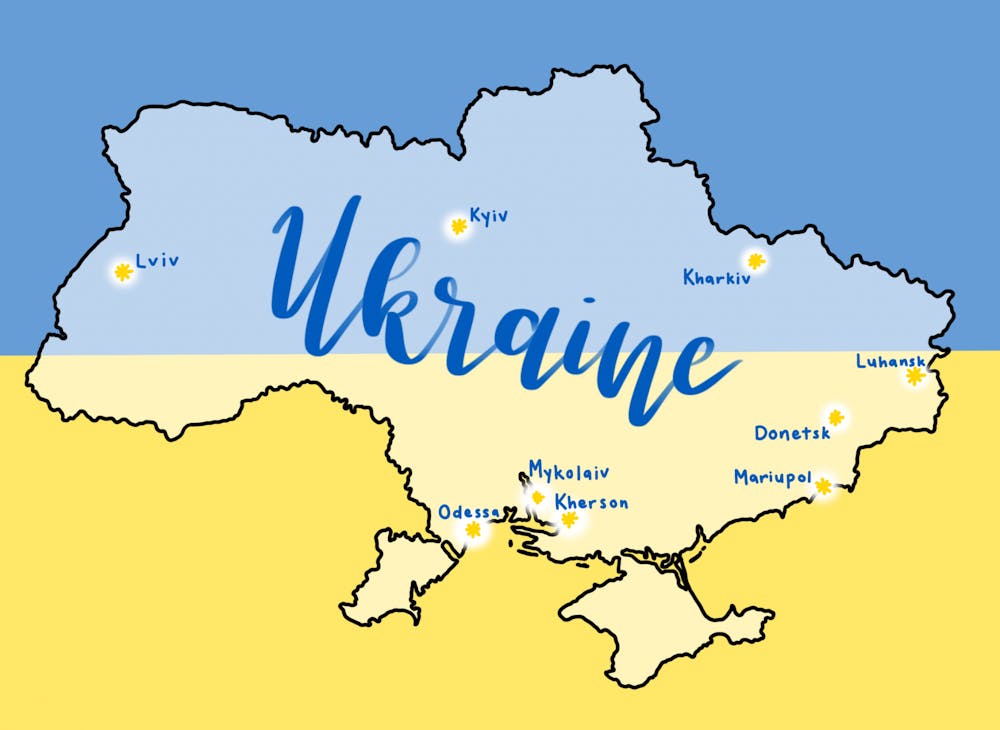During the past few years — and particularly in the midst of the current Russian invasion of Ukraine — one idea I have heard repeated over and over again is that we are living in unprecedented times. As I scroll through social media and read the posts and articles incessantly repeating this notion, I cannot help but to look back in history and think that these times could not be more precedented. Rather frighteningly, they are remarkably similar to the events preceding World War II.
The ongoing invasion of Ukraine ordered by Russian president Vladimir Putin looks a lot like Adolf Hitler’s early power grabs in Austria and Czechoslovakia. Both were justified under the guise of rescuing persecuted expats from genocidal foreign powers, though these claims were completely falsified in both cases. This story is all too familiar and has previously been a dark indicator of difficult times to come. Now what can we do?
As a student of history, I believe that possible solutions can be found by analyzing the actions taken by world leaders against the Nazi regime. British Prime Minister Neville Chamberlain’s strategy of appeasement comes to mind immediately, serving as a reminder of the consequences of inaction in difficult times. Alternatively, Churchill’s gung-ho attitude toward conflict represents the opposite end of the spectrum — providing a lesson in decisiveness, but also in the pitfalls created by a lack of patience.
Our current leaders can certainly learn from these past leaders, ideally exercising a combination of Chamberlain’s caution and Churchill’s forcefulness in the trying times to come. Participating in global geopolitics is a difficult balancing act — one that has been massively upset by Russia’s invasion. In light of this, our leaders are tasked with restoring the delicate balance. They must close the gaping wound opened up by Putin, taking care to do more than simply slap Chamberlain's proverbial band-aid on things and call it a day. We have seen in the past that granting concessions to a tyrant like Putin can have catastrophic consequences. They must also be measured in their response, avoiding the nuclear option at all costs — a full-scale war between major world powers could very well spell the end of modern civilization.
To their credit, world leaders have thus far stepped up to the plate. The White House not only imposed harsh sanctions on Russia in response to the invasion, but has approved $350 million in military aid to Ukraine. The United Kingdom has banned Russian ships from entering its ports and airspace. Perhaps most importantly, major Russian banks have been cut out of the Society for Worldwide Interbank Financial Telecommunications banking system. These actions — which often come at a considerable cost to the nations invoking them — are encouraging signs that the world is not taking this invasion lightly. However, the invasion thus far is likely just the beginning, and further action may be necessary.
Since the end of the Vietnam War, the western world has largely been in a lull — or as was said in the wake of 9/11 — on a “holiday from history.” Now summer has ended, and we are being forced to return to historical reality. In this short respite from global conflict, we have forgotten that war is really the rule rather than the exception, and that the enduring peace of our lifetime has been but a curious anomaly. However as Hitler’s virtually unopposed aggression preceding WWII clearly showed, it is no easy task to willingly leave peace and enter into conflict. In spite of this, our leaders must continue to show resolve in this matter. We must hold our ground, while also exercising judicious de-escalation whenever possible. We must stand up to both the physical and ideological war being waged in Ukraine.
At the heart of both Hitler’s aggression in 1938 and Putin’s current invasion is an ideological agenda of “reunification”. Hitler’s vision of Anschluss is not dissimilar to Putin’s quest for a reborn empire. These militant fantasies are born of hatred — centered on ideas of ethnic superiority and a return to former glory that never really existed. We’ve seen this story play out before, and it came at an unimaginable cost. Therefore, we must learn the lessons of those in power who, during Hitler’s rise, failed to adequately oppose the evils of Nazi Germany. We must not be too hasty to put this invasion behind us and declare that we have brought “peace for our time.” For we cannot allow history to repeat itself.
Thomas Laughridge is an opinion columnist for The Cavalier Daily. He can be reached at opinion@cavalierdaily.com.
The opinions expressed in this column are not necessarily those of The Cavalier Daily. Columns represent the views of the authors alone.







